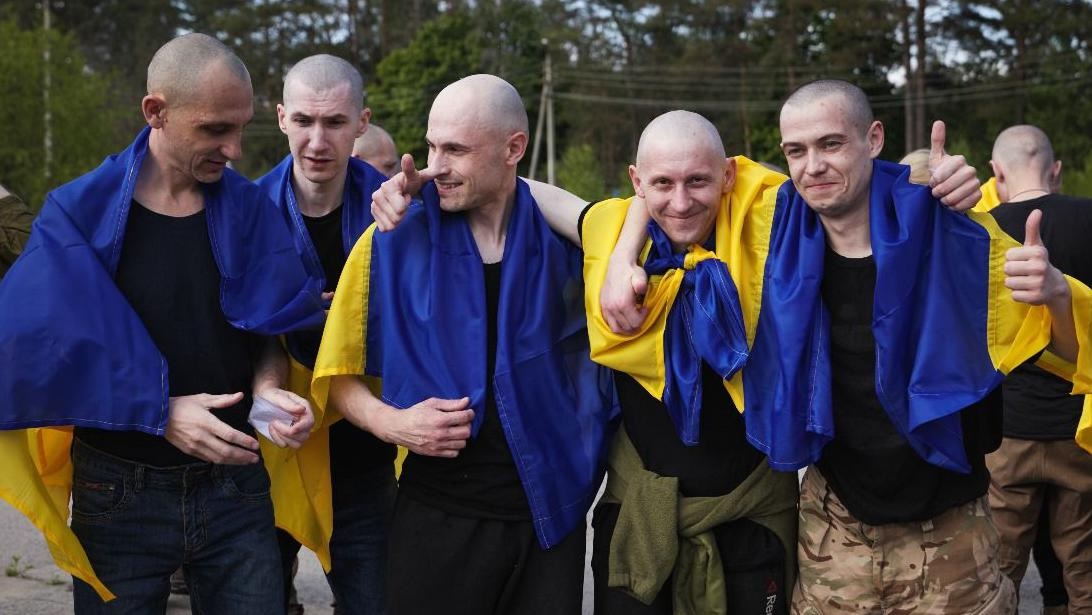Ukraine and Russia have carried out a major prisoner-of-war (POW) exchange, on Saturday, June 14, 2025, representing a meaningful development in their prolonged conflict.
Ukrainian President Volodymyr Zelenskyy announced on social media that this was the fourth exchange within a single week, underscoring Kyiv’s ongoing commitment to securing the release of its citizens held by Russia.
The exchange comes amid rising hostilities on the battlefield and illustrates how both sides are managing limited humanitarian cooperation even during heightened military tensions.
Russia’s Ministry of Defence also confirmed the operation, stating via Telegram that another group of Russian servicemen had been returned from territories under Ukrainian control.
This exchange was reportedly conducted in accordance with the terms negotiated by the two countries during recent meetings in Istanbul.
The Russian announcement was accompanied by footage of returning soldiers, visibly emotional as they arrived in Belarus, where they were greeted with cheers and Russian flags.
The men chanted slogans such as “Russia, Russia” and “Glory to Russia” before being taken for medical evaluations prior to their return to Russia.
Simultaneously, in a separate but related development, Moscow transferred the remains of 1,200 deceased Ukrainian soldiers to Kyiv.
Ukrainian officials confirmed the handover, stating that forensic experts are now working to identify the bodies.
This effort forms part of a broader bilateral agreement that involves the repatriation of up to 6,000 bodies from each side, alongside the mutual return of seriously wounded POWs and young prisoners under the age of 25.
Earlier in the same week, Ukraine had recovered an additional 1,212 bodies of fallen servicemen, bringing the total for the week to more than 2,400.
However, the process remains asymmetrical.
While Ukraine has received thousands of its war dead, Russia has publicly stated that it has not yet received the remains of any of its own soldiers.
This discrepancy has raised questions and highlighted the sensitive, uneven, and often politicized nature of body repatriation during wartime.
Russian officials reiterated on Friday that while they have complied with the return of Ukrainian bodies, no reciprocal action had been taken by Kyiv.
These humanitarian exchanges come amid a sharp escalation in military activity, particularly in northeastern Ukraine’s Sumy region.
Russian forces have increased their offensive operations in an attempt to create what they describe as a “buffer zone” along the border.
Ukrainian President Zelenskyy reported that Ukrainian forces had successfully repelled Russian advances in that area and had even regained control of a strategically located village.
This localized success was presented as evidence that Ukraine continues to resist territorial incursions despite mounting pressure.
Nevertheless, these developments have not translated into broader progress toward ending the war.
Although exchanges of prisoners and bodies represent limited diplomatic engagement and potential goodwill, they have not yielded any breakthroughs in peace negotiations or temporary ceasefire agreements.
There had been initial signs of movement earlier this year, especially after U.S. President Donald Trump expressed interest in facilitating dialogue between the two countries.
However, in recent statements, Trump appeared increasingly dismissive of immediate intervention, comparing the conflict to a playground fight and suggesting the parties should continue clashing for a while longer before diplomatic pressure is reapplied.
In the meantime, the ongoing war continues to take a heavy toll on both nations.
The prisoner swaps, while a source of national relief and morale for families awaiting news of their loved ones, remain symbolic of the broader human cost of the conflict.
Both Russia and Ukraine have shown a willingness to engage in these limited exchanges, but absent a broader political settlement, the war rages on, with civilians, soldiers, and infrastructure bearing the brunt of its destructive force.
As military operations intensify and humanitarian concerns grow, the international community continues to monitor developments closely, hoping for renewed momentum toward a more lasting peace.



